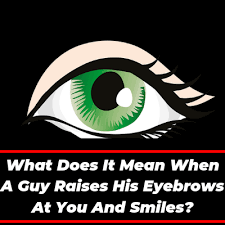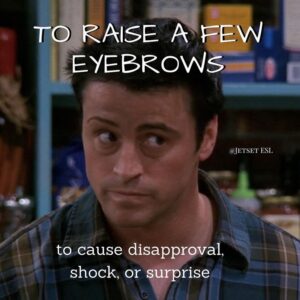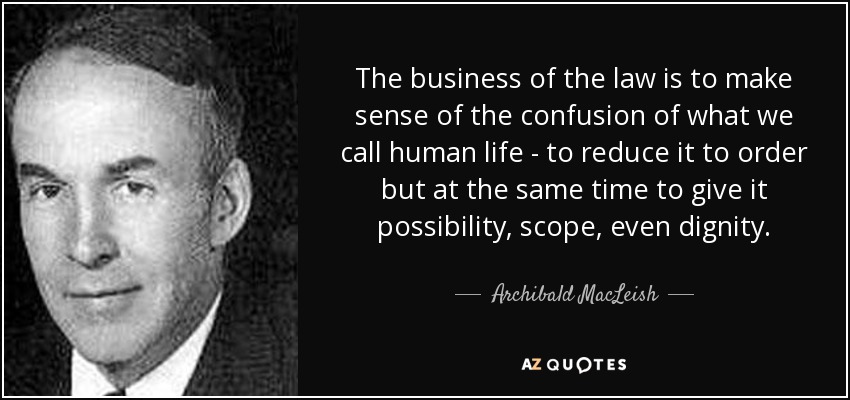


Page description
Discover what it means to ‘raise eyebrows’ – exploring surprising actions and controversial topics that trigger reactions and provoke thought.
Raise (a few) Eyebrows
idiom
To cause surprise or shock
Jemma’s miniskirt raised a few eyebrows at the board meeting.
Cambridge Dictionary
Raise an eyebrow to raise your eyebrows
If something causes you to raise an eyebrow or to raise your eyebrows, it causes you to feel surprised or disapproving.
An intriguing item on the news pages caused me to raise an eyebrow over my morning coffee.
He raised his eyebrows over some of the suggestions.
He was looking at her with his eyebrows raised questioningly.
Collins Cobuilt
The Britannica Dictionary Ask the Editor
Question
What does it mean to “raise eyebrows”? — Sammy, Ghana
Answer
To raise eyebrows means to cause other people to react with surprise or mild disapproval. To raise an/your eyebrow means to move your eyebrows up in a way that shows surprise or mild disapproval.
Both of these phrases are often used figuratively.
The following example sentences show how each phrased is used.
To raise eyebrows
Her sudden outburst in class raised eyebrows. [=classmates reacted with surprise or mild disapproval to her outburst]
He raised eyebrows when he walked down the street in a winter coat during summer. [=people were surprised to see him in clothing that was not appropriate for the weather]
The band’s new album is raising eyebrows [=causing people to act with surprise or disapproval] with its shocking lyrics.
The scandal raised eyebrows [=caused surprise and/or disapproval] all over town.
To raise an/your eyebrow
He raised an eyebrow at his mother when she bought a sports car. [=he was surprised that his mother bought a sports car]
The townspeople raised their eyebrows at the new strict laws. [=they felt disapproval towards the new laws]
No one raised an eyebrow [=no one was surprised] when he quit his job; he never liked it anyway.
Her brother raised an eyebrow [=he expressed surprise and/or disapproval] when she told him she was moving to Los Angeles to pursue acting.
Raise your eyebrows
To move your eyebrows upwards in order to show surprise or disapproval
‘Really?’ she said, raising her eyebrows.
This decision caused a few raised eyebrows (=surprised some people).
→ eyebrow
Examples from the Corpus
raise your eyebrows
• She did not speak when he raised his eyebrows the second time, so in went onions, mustard and ketchup.
• He raised his eyebrows but he didn’t actually skewer my hand to his desk with his favourite kris.
• While he was pouring the drinks Ron the landlord raised his eyebrows at me.
• Your facial expressions can help to emphasize parts of your speech too: try smiling, scowling, or raising your eyebrows.
• Rose raised his eyebrows and drank a cup of Mrs Burbanks’ tea.
• She raised her eyebrows and drew out a hank of hair, backing slowly away from me.
raise your eyebrows
to show surprise, doubt, disapproval etc by moving your eyebrows upwards
Blanche raised her eyebrows in surprise.
→ raise
Examples from the Corpus
raise your eyebrows
• Your facial expressions can help to emphasize parts of your speech too: try smiling, scowling, or raising your eyebrows.
• Rose raised his eyebrows and drank a cup of Mrs Burbanks’ tea.
• She raised her eyebrows and drew out a hank of hair, backing slowly away from me.
• While he was pouring the drinks Ron the landlord raised his eyebrows at me.
• He raised his eyebrows but he didn’t actually skewer my hand to his desk with his favourite kris.
• Karen smiled and raised her eyebrows: Check that!
• She did not speak when he raised his eyebrows the second time, so in went onions, mustard and ketchup.
Longman Dictionary of Contemporary English
1 Raising Eyebrows: The Role of Integrity in the Legal Profession
The legal profession holds a unique responsibility to uphold justice and protect human dignity. Yet, as with any field, it is not immune to individuals who exploit their position for personal gain, undermining trust and fairness.
This page explores the stark contrast between lawyers who honor their duty with integrity and those whose actions tarnish the profession. From cases of blatant misconduct to systemic failures, such as the wrongful imprisonment of Ryan Ferguson, we examine how abuses of power within the legal system can have far-reaching consequences, disrupting lives and eroding public trust.
Through reflections on accountability, ethics, and the intrinsic duty of honesty, we shed light on the profound responsibility borne by those who serve as pillars of justice.
De Wenkbrauwen Fronsen: De Rol van Integriteit in de Advocatuur
De juridische professie draagt een unieke verantwoordelijkheid om gerechtigheid te waarborgen en menselijke waardigheid te beschermen. Toch is, zoals in elke beroepsgroep, ook deze niet immuun voor individuen die hun positie misbruiken voor persoonlijk gewin, waardoor vertrouwen en eerlijkheid worden ondermijnd.
Deze pagina onderzoekt het schrille contrast tussen advocaten die hun plicht met integriteit vervullen en degenen wiens acties het beroep beschadigen. Van gevallen van flagrante misstappen tot systemische fouten, zoals de onterechte gevangenschap van Ryan Ferguson, bekijken we hoe machtsmisbruik binnen het juridische systeem verstrekkende gevolgen kan hebben, levens ontwricht en het publieke vertrouwen ondermijnt.
Door te reflecteren op verantwoordelijkheid, ethiek en de intrinsieke plicht tot eerlijkheid, belichten we de diepgaande verantwoordelijkheid van degenen die als pijlers van gerechtigheid dienen.
2 The dignity of the lawyer
Among lawyers, you have those who are outstanding but there is also recognisable abuse, those who drag the profession through the mud. Embarrassing practices that discredit the lawyer.
It is a runaway system, completely out of control like in ‘The Blind Leading the Blind’:
Abiding in the midst of ignorance, thinking themselves wise and learned, fools go aimlessly hither and thither, like blind led by the blind. (next page).
When you come across a lawyer without self-awareness, who shamelessly and unscrupulously does wrong things, you get a situation where you can disrupt society. Such a person is not fit to be part of the entities of justice and should be struck off as a lawyer.
Those who do not feel the human suffering they cause by digging trenches through fraudulent means with a war of words to fuel their business model.
Even a lawyer has the intrinsic duty to treat people with honesty and integrity, and not to act as the old Flemish expression says: ‘Money makes straight what is crooked.
It happens that the only thing lawyers do is steal from people. It is shameful that justice is sometimes used solely to funnel money to lawyers through the use of wrongful practices.
It’s the kind of lawyers who turn a simple, straightforward matter into a completely destructive event, Instead of solving it, so to speak, with the snap of fingers.
A lawyer can deliberately make a complete mess of the life of someone who has done absolutely nothing wrong.
The lawyer: the weakest link in the whole, even a bad apple in the basket of a broken justice system.
A clear example, as explicitly mentioned in the Ryan Ferguson case, where he spent his entire twenties in prison, even though he was not present at the scene of the crime, and the convicted eyewitness, who later admitted to lying, could not have seen it from where he was!
One can effortlessly use justice for the wrong reasons and deliberately do wrong things, in other words what one achieves is based on a blunder. Blundering of I can’t anymore.
To throw a spanner in the works to disrupt a fair process. Which essentially means intentionally interfering or obstructing a fair proceeding or process.
Anyone who puts a spoke in the wheel and stops the course of justice from going ahead or stops the real issusse coming to the surfuce will bear an enormously heavy burden of responsibility.
Bij de advocaten heb je zij die uitmuntend zijn maar er is ook herkenbaar misbruik, zij die het vak door het slijk halen. Beschamende praktijken die de advocaat in diskrediet brengen.
Het is een op hol geslagen systeem, zoals in ‘The Blind Leading the Blind’:
Volharden in onwetendheid, denkend wijs en geleerd, zoals gekken doelloos naar hier en daar, zoals de blinde de blinde leidt (volgende pagina).
Wanneer je op een advocaat stoot zonder zelfbesef, die abject gewetenloos foute dingen doet, krijg je een situatie waar je de samenleving kunt ontwrichten. Zo’n soort persoon is niet geschikt om onderdeel te zijn van de entiteiten van justitie en dient geschrapt te worden als advocaat.
Zij die het menselijk lijden niet voelen die ze veroorzaken door loopgraven te graven door frauduleus te werk te gaan met een oorlog van woorden om hun businessmodel te spijzen.
Ook een advocaat heeft de intrinsieke plicht om in alle eerlijkheid en integriteit met mensen om te gaan en niet te handelen zoals de oude Vlaamse uitdrukking zegt: ‘Geld maakt recht wat krom is’
Het gebeurt dat het enige wat advocaten doen is mensen bestelen. Het is beschamend dat justitie soms wordt gebruikt alleenlijk om advocaten geld toe te schuiven door gebruik te maken van foute praktijken.
Het is het soort advocaten die van een eerlijke, eenvoudige kwestie een compleet destructief gebeuren maken, in plaats van het als het ware bij het knippen van de vingers op te lossen.
Een advocaat kan met opzet een complete puinhoop maken van het leven van iemand die helemaal niks verkeerd heeft gedaan.
De advocaat: de zwakste schakel in het geheel, zelfs een slechte appel in de mand van een gebroken justitie systeem.
Een duidelijk voorbeeld zoals uitdrukkelijk vernoemd in de zaak Ryan Ferguson, die zijn volledige twintiger jaren in de gevangenis zat, hoewel hij zelfs niet op de plaats van het misdrijf was en de veroordeelde ooggetuige die achteraf bekend dat hij gelogen heeft, kon het niet gezien hebben vanop de plaats waar hij zich bevond!
Men kan justitie moeiteloos gebruiken voor de verkeerde redenen en bewust foute dingen doen, met andere woorden wat men bereikt is gebaseerd op een blunder. Blunderen van ik kan niet meer.
Stokken in de wielen steken om een fair verloop te ontwrichten.
Wie stokken in de wielen zou steken om de rechtsgang te hinderen of dat de echte kwestie aan de oppervlakte komt, die draagt een enorm zware verantwoordelijkheid.
It is not acceptable for the lawyer to secretly disrupt a judicial event
and thus effortlessly destroy the life of someone of good character
who has done no wrong.
In a justice system used for the wrong reasons,
one plays with a life of a human being or even a child
just like the Candid Camera.
It is ‘An Inconvenient Truth’.
It is a disconcerting question regarding the lawyer
Are you still human?
Is this still a society?
If a lawyer uses unlawful practices against his or her better judgment
then you get an unlawful decision anyway.
Consequently, fiddling in that way is pointless.
Scamming in that way makes no sense.
In particular, it is meaningless if reality is known by each.
“Raise eyebrows” is an idiomatic expression that can have multiple meanings depending on the context in which it is used. Here are some key points about this phrase:
Meaning: “Raise eyebrows” generally means to cause surprise, shock, or disapproval in others due to something unexpected, unusual, or controversial. It often implies that something has caught attention or caused a reaction that is noteworthy or potentially controversial.
Facial expression: The literal action of raising one’s eyebrows is often associated with surprise or disbelief. It involves lifting the eyebrows upward, typically in a quick and noticeable manner, which can convey emotions such as shock, skepticism, or curiosity.
Social cues: When someone says or does something that raises eyebrows, it can be interpreted as deviating from social norms, conventions, or expectations. It may result in others reacting with curiosity, skepticism, or disapproval, depending on the context and cultural norms.
Context-dependent: The meaning and connotation of “raising eyebrows” can vary greatly depending on the situation, cultural background, and individuals involved. What may raise eyebrows in one cultural or social context may not have the same effect in another.
Usage: “Raise eyebrows” is commonly used in informal conversations, discussions, and written language, such as news articles, social media, and literature, to describe actions, events, or statements that are unexpected, controversial, or attention-catching.
Examples: Some examples of how “raise eyebrows” can be used in sentences are:
- His extravagant spending habits raised eyebrows among his colleagues.
- The politician’s controversial statement about immigration policy raised eyebrows among the public.
- The new fashion trend of wearing mismatched socks has been raising eyebrows in the fashion industry.
- Her sudden change in behavior at the party raised eyebrows and sparked speculation.
In summary, “raise eyebrows” is an idiomatic expression that conveys surprise, shock, or disapproval due to unexpected or unusual actions, events, or statements. It is context-dependent and commonly used in informal language to describe situations that deviate from social norms or expectations.


Notice
- The sentence “Lawyers will always buckle under to something, whether it’s bribes, violence, court orders, or the weight of their own bullshit” conveys a negative perception of lawyers, suggesting that they are susceptible to various forms of pressure or corruption.
- The sentence implies that lawyers may succumb to external influences such as bribes or violence, as well as internal factors like their own dishonesty or deception (“the weight of their own bullshit“).
- It implies a lack of integrity or moral fortitude among lawyers, suggesting that they may compromise their principles or professional ethics in the face of different types of coercion or their own deceitful behavior.
- The sentence may reflect a cynical or critical view of the legal profession, portraying lawyers as weak-willed or easily swayed by different forms of persuasion or manipulation.
- However, it’s important to note that this sentence represents a subjective opinion or viewpoint, and not necessarily a universal truth about lawyers.
Bemerk
De zin “Advocaten zullen altijd ergens voor bezwijken, of het nu gaat om steekpenningen, geweld, gerechtelijke bevelen of het gewicht van hun eigen bullshit” geeft een negatief beeld van advocaten, en suggereert dat ze vatbaar zijn voor verschillende vormen van druk of corruptie.
De zin impliceert dat advocaten kunnen bezwijken onder externe invloeden zoals steekpenningen of geweld, maar ook onder interne factoren zoals hun eigen oneerlijkheid of bedrog (“the weight of their own bullshit”).
Het impliceert een gebrek aan integriteit of morele standvastigheid bij advocaten, wat suggereert dat zij hun principes of beroepsethiek in gevaar kunnen brengen tegenover verschillende soorten dwang of hun eigen bedrieglijk gedrag.
De zin kan een cynische of kritische kijk op de advocatuur weerspiegelen, waarbij advocaten worden afgeschilderd als zwakzinnig of gemakkelijk te beïnvloeden door verschillende vormen van overreding of manipulatie.
Het is echter belangrijk op te merken dat deze zin een subjectieve mening of standpunt vertegenwoordigt, en niet noodzakelijkerwijs een universele waarheid over advocaten.
Badass Granny and her Guns Prank!
To say this granny likes to stay safe at home is… a HUGE understatement. Our advise: don’t mess with her.